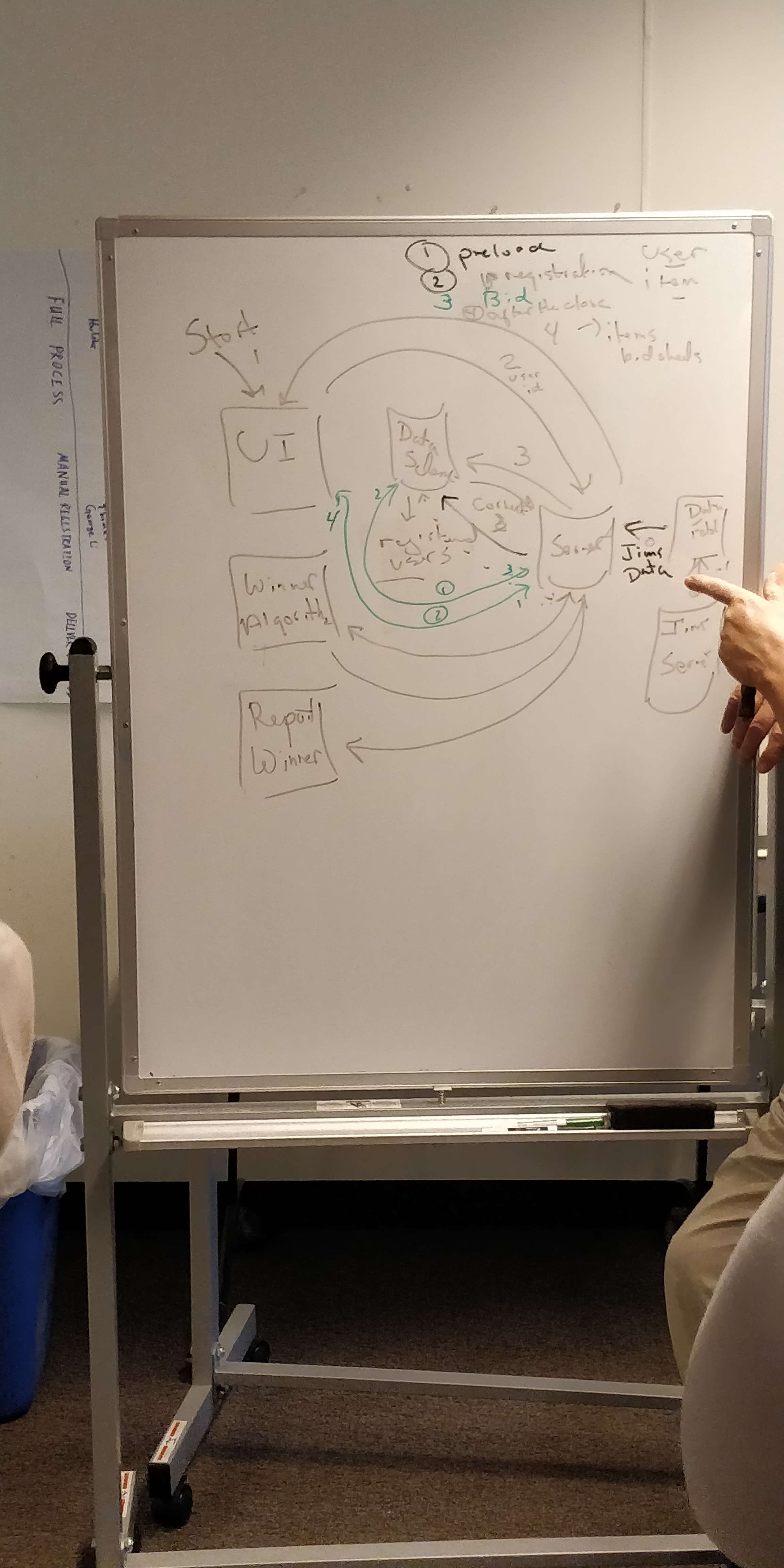While we’ve been working on the ‘tasks’ of the auction project separately, most people in the classroom are used to working locally and/or have never had to build something entirely out of scratch (and debug it). So we made a point in class to determine which side communicates with who, what do they send (and receive), etc, and the steps that they do it in. These steps are done in a manner relative to the action course a user must take to use our platform. I will be talking about each side in the manner that was detailed in the first post, with the added element of ‘external server’, which refers to the existing auction platform that we will be pulling information from.


I will write the legend and what it actually means sometime this week. Probably.
This is how the communication model looks from my side, in very general terms:
- Server to UI: File access through apache module (cgi)
- UI to Server: Output and scripting
- Server to Data Schema: Access through login + service +port
- Data Schema to Server: Perform commands as requested from server
- Server to Winner Algorithm: File access through apache module (cgi)
- Winner Algorithm to Server: Output and scripting
- Server to Winner Reporting: File access through apache module (cgi)
- Winner Reporting to Server: Output and scripting
- Server to Data Fetch: Receive HTTP request, communicate through adequate ports as needed (80, 3306, 443…)
- Data Fetch to Server: Send HTTP request, communicate through adequate ports as needed (80, 3306, 443…)
While all of this might be obvious to more experienced people, it was a good exercise to do so as to avoid confusion, teach server architecture, and explicitly show how this all depends on good teamwork (i.e, you can’t have a real UI if your back-end doesn’t do work). Even if this is a “senior” class, there is no real requirements to meet to enter any class, and so we even have Freshmen. I’m all for it, and I think even Seniors can benefit from this, as I doubt any of them have had formal education in these subjects. My college is… not great for Computer Science. I am lucky I got most of my education before I transferred here, and have real actual job experience.
As we wrap up the details of the setup for our first project, discussion has begun for Quantum Leap. For 3 days each month, the class will go to the high school for an hour to interview the students and conduct class. The goal of this project is to create a (sort of) social media that will serve as a student record system, for students. The prompt for all of this was the problem that students face when graduating: all of their work is kept in a portfolio that belongs to the school, who deletes and/or revokes access to the system once they’re out of high school. For a kid, this is unimportant in the short term, as they are not using it/they don’t care, etc. But they WILL need it when they apply for college, and they will be hindered if they can’t find evidence for what they worked on. I’ve faced this problem myself, and this whole website is my response to losing my files constantly. Even if a teenager can’t see the problem, we will try to fix it for them.
So our first task will be: find out what they want. It’s no use to build a platform if in the end they won’t use it. We worked on what we thought was important to know, and noted the following:
- How does the interview process go?
- First we introduce ourselves, ask what their interests so we can mix our questions with a bit of small talk (so as to break the ice). Break class into smaller groups so we can take more control over it. Put examples of personal websites, profile.
- An idea: put a schedule in the website that has the student’s schedule, homework, etc.
- Questions to ask:
- What do they want to put into their personal website/profile?
- What they DON’T want to put into it.
- What do they want to use it for?
- How do you want it to look?
- What do you like about other social media platforms that you’d like to see here?
- Which social media do you use/why do you use it?
These ‘interviews’ will be conducted next week, and we’ll go from there to see what and how we will do.
Comments
This post has no comments yet. Be the first to comment